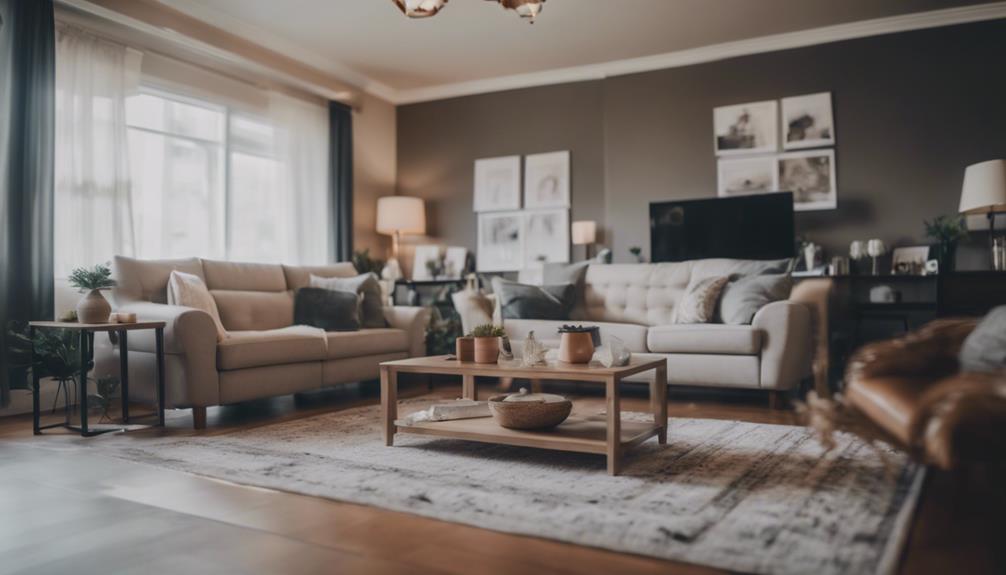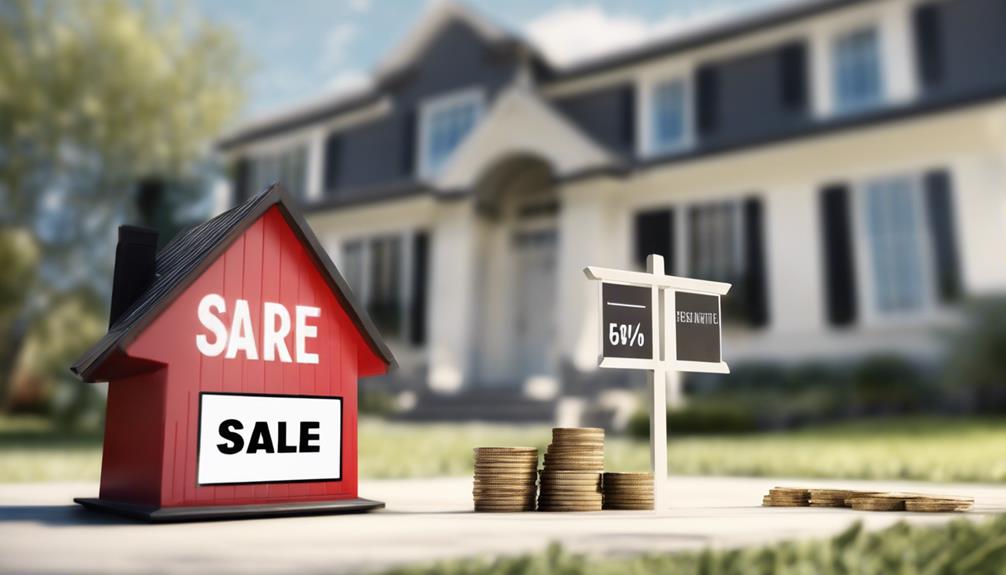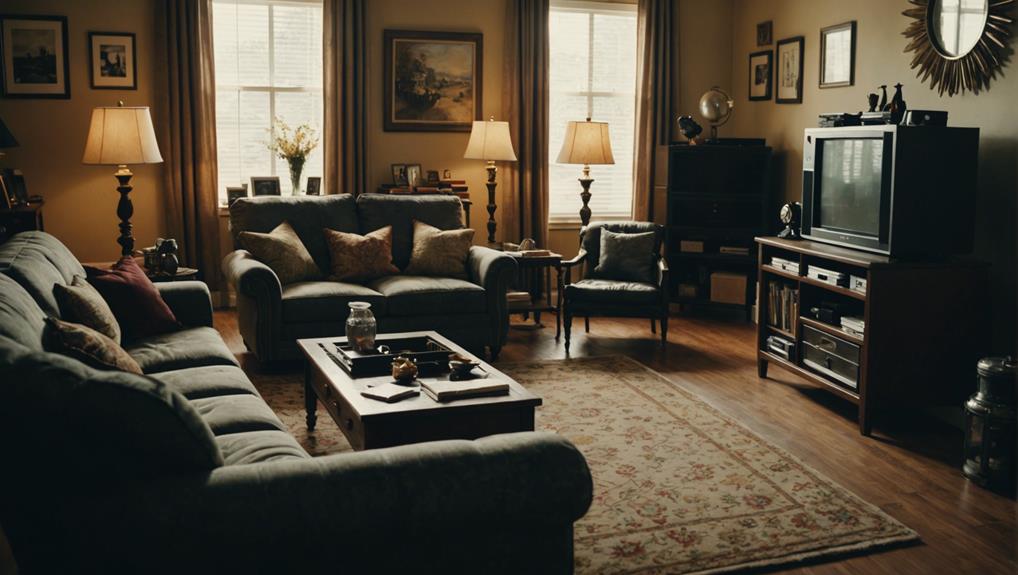Staging a house effectively can significantly increase its value and accelerate its sale. However, this strategy involves certain challenges such as initial financial outlays for consultations and rentals of stylish furniture. It also requires time devoted to setting up and maintaining the staged appearance, which might interfere with daily living spaces.
While staging helps in presenting a property in the best light, it risks making the home feel less personal and potentially misrepresenting certain aspects of the property. Regular upkeep is essential to keep the home looking pristine throughout the period it is listed.
Despite these obstacles, with careful planning and execution, staging can be a powerful tool to enhance the attractiveness of a home on the market.
Costly Expenses
Staging a home is a strategic investment that can significantly enhance its marketability and potentially increase its sale price. On average, the initial cost for staging can range from $300 to $600, with additional expenses for design consultation and furniture rental. For a 2,000-square-foot home, these costs, while not insignificant, are an investment towards making the property more appealing to potential buyers.
Professional staging services leverage their expertise to highlight a home's best features, which can lead to quicker sales and possibly higher offers. Although there's an upfront cost, the financial benefits of staging a home often outweigh these initial expenses. Homeowners should consider the potential return on investment that staging can offer, especially when aiming to achieve a swift and profitable sale.
Time-Consuming Process
Staging a home is a strategic process aimed at enhancing its appeal to attract potential buyers and achieve a quicker sale at a higher value. Homeowners undertake this effort by carefully arranging furniture, decor, and lighting to showcase the property's best features and potential. While staging does require a significant investment of time and effort, including initial consultations, planning, and meticulous organization, the payoff can be substantial.
By presenting a clean, appealing, and well-thought-out space, homeowners can make a lasting impression on buyers, leading to faster sales and possibly higher offers. The process, though possibly extending timelines and necessitating ongoing maintenance to keep the staged look fresh for showings, is an investment in maximizing the property's appeal. Homeowners need to stay dedicated to maintaining this staged appearance, as any dip in presentation quality can impact buyer perceptions.
Despite the challenges and potential disruptions to daily routines, the strategic advantage gained through staging is invaluable. It not only helps in selling the property more swiftly but also in potentially increasing its market value, making the time and effort worthwhile. By committing to this process, homeowners can significantly enhance their chances of a successful and profitable sale.
Disruption to Personal Space

Staging your home is a strategic move to enhance its appeal and market value, ultimately aiming to facilitate a quicker sale. While this process involves a significant rearrangement of your space and can feel like an invasion of your personal territory, it's a temporary yet effective method to attract potential buyers. The professional touch in organizing and decorating your home transforms it into a welcoming and attractive environment, making it more appealing to a broader audience.
However, maintaining this staged appearance does require ongoing effort, which can introduce a level of stress as you strive to keep your living space pristine at all times. It's crucial to strike a balance between creating an ideal showcase for buyers and retaining a comfortable living environment for yourself.
Adopting a positive mindset towards the temporary changes in your living space can help mitigate feelings of discomfort. Viewing the staging as a necessary step towards a successful sale can help ease the emotional burden, allowing you to focus on the benefits of selling your home efficiently and possibly at a higher price.
Potential Misrepresentation
Staging a home is a strategic way to enhance its appeal and encourage a quicker sale at a higher price. By presenting the property in its best light, sellers can create a captivating first impression that resonates with potential buyers.
To understand the benefits of effective home staging, consider the following strategies:
| Enhancing Aesthetics | Maximizing Space | Highlighting Features |
|---|---|---|
| Focusing on the visual appeal through tasteful decoration and styling can highlight the home's strengths and charm, making it more attractive to buyers. | Arranging furniture and decor to optimize the layout can make spaces appear larger and more inviting, thus appealing to buyers looking for ample room. | Showcasing renovated or updated areas can draw attention to the investments made in the property, assuring buyers of the quality and care taken in maintaining the home. |
Lack of Personalization

Staging a home effectively can greatly enhance its marketability and speed up the sale process by highlighting its best features and creating an inviting atmosphere. When a home is strategically staged, it accentuates the space, functionality, and potential of the property, making it more appealing to a broad range of buyers. This method involves depersonalizing the space to a degree, which helps potential buyers visualize themselves living in the home and making it their own, thereby fostering a quicker emotional connection.
While personal touches can give a home character and charm, they can also distract buyers from envisioning their own future in the space. By neutralizing the decor and removing overly personal items, staging can transform a lived-in home into a ready-to-move-in property that appeals to the aspirational desires of buyers. This approach not only makes the home more attractive but also sets it apart from less-prepared properties on the market, potentially leading to a faster sale and even a higher selling price.
Balancing the art of staging with keeping a touch of the home's unique character is crucial. It's about creating a welcoming, universally appealing space that still retains enough personality to stand out. By doing so, staging can effectively turn a home into a canvas ready for new stories, while still hinting at its rich history and inherent charm.
Maintenance Demands
To enhance the value of a home and accelerate its sale, staging plays a pivotal role, necessitating meticulous and ongoing maintenance to ensure the home looks its best at all times. The effort involved in keeping a staged home in immaculate condition is considerable, as it requires constant vigilance to maintain the aesthetic appeal meticulously curated for potential buyers. This continuous attention to detail ensures that every element of the staging remains perfect and any signs of wear during showings are promptly addressed.
Homeowners must frequently tidy up and adjust the decor to ensure the home remains in show-ready condition, enhancing its attractiveness to prospective buyers. The process of staging, from planning to implementation, demands a significant amount of work, but it's crucial for making a great first impression. The maintenance efforts, though demanding, play a crucial role in presenting the home in the best possible light, thereby increasing its marketability and helping to secure a quicker sale at a potentially higher price. The additional effort and upkeep, while challenging, are often rewarded by the benefits of a faster and more profitable sale.
Emotional Impact

When staging a home for sale, the primary objective is to increase the property's market appeal and accelerate the selling process. This strategy involves transforming the personal living spaces into a more universally appealing setting, which can significantly enhance the perceived value of the home and attract more potential buyers. However, this transformation can evoke a mix of emotions for sellers as they see their personalized environments become neutralized and optimized for sale.
The meticulous upkeep required during the staging process can also intensify these emotional reactions, particularly for those who've deep attachments to their homes. Observing their spaces being carefully curated and altered may make sellers feel somewhat distanced from the personal memories and emotional connections they associate with their property. This can add a complex emotional layer to the selling experience.
Despite these challenges, it's crucial for sellers to recognize that staging is an effective tool designed to highlight the home's best features, potentially leading to quicker sales and better offers. While it may feel unsettling at first, understanding the benefits of staging can help sellers navigate the process more comfortably, keeping in mind the ultimate goal of maximizing their home's value in the competitive real estate market.
Local Market Considerations
Understanding local market conditions is crucial when considering the benefits of staging a home to enhance its value and accelerate the sale process.
In real estate markets where there's an abundance of staged homes, differentiating your property through superior staging can still capture buyer interest and stand out from the competition. Conversely, in slower markets, effective staging can be a critical factor in generating buyer interest and facilitating a quicker sale.
In areas with high demand, staging can further increase a property's appeal, potentially driving up the sale price despite the already favorable market conditions. Investing in staging is worthwhile when it's strategically planned to highlight the unique features of the home, appealing directly to local buyer preferences.
Uncertain Return on Investment

The potential for increasing a home's value and accelerating its sale time can make staging an attractive option for homeowners. When considering staging your home to enhance its market appeal, it's important to recognize the advantages it can offer. Here are three key points to consider:
- Enhanced Home Value: Staging a home can create a more appealing and welcoming environment for potential buyers, potentially leading to a higher selling price. Although it requires an initial investment, the visually appealing result can significantly increase the perceived value of your home.
- Faster Sale: A well-staged home often sells faster than non-staged counterparts, especially in fluctuating markets. By appealing to a broader range of buyers with a clean, styled appearance, staging can reduce the time your home spends on the market, allowing you to move forward more quickly.
- Competitive Edge: In a tight market, staging your home can give it a distinct advantage over others that aren't staged. Homeowners should consider the investment in staging as a means to stand out in the market, potentially outweighing any initial financial concerns due to the quicker and more profitable sale.
Conclusion
In conclusion, when considering staging your home for sale, it's imperative to recognize the potential advantages. Staging can significantly enhance the appeal of your property, making it more attractive to potential buyers which often results in a quicker sale.
Moreover, a well-staged home can potentially increase the selling price, offering a good return on investment despite the initial costs involved. While staging may require time and effort, the emotional appeal it creates can make a substantial difference in a competitive market.
Therefore, carefully assess the benefits of staging your home, as it could be a strategic move to achieve a faster sale and a better price.

